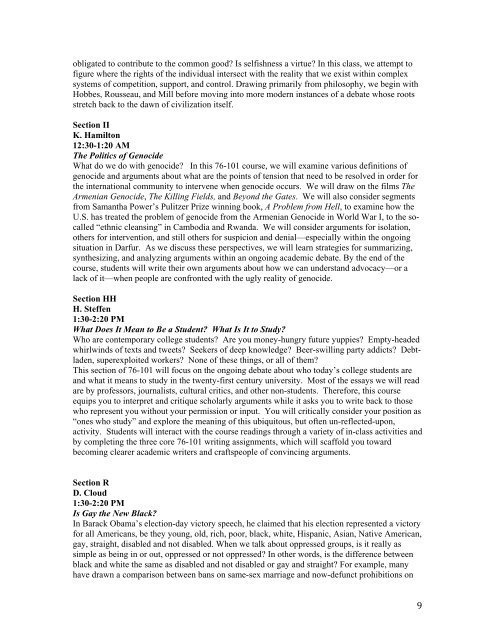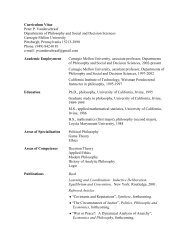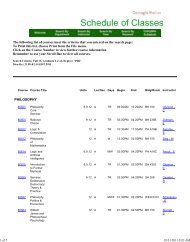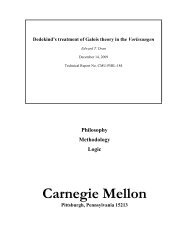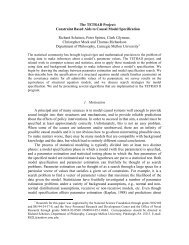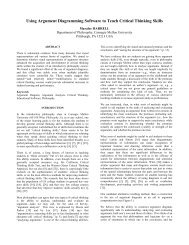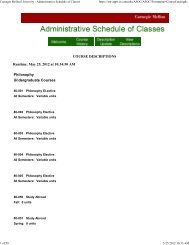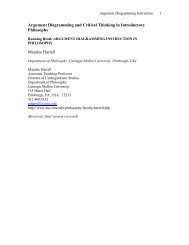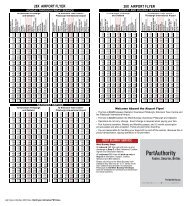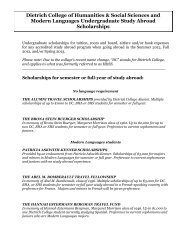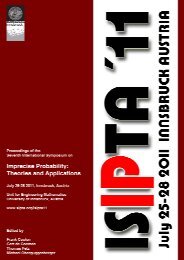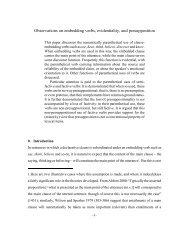First-Year English Program - College of Humanities and Social ...
First-Year English Program - College of Humanities and Social ...
First-Year English Program - College of Humanities and Social ...
You also want an ePaper? Increase the reach of your titles
YUMPU automatically turns print PDFs into web optimized ePapers that Google loves.
obligated to contribute to the common good? Is selfishness a virtue? In this class, we attempt to<br />
figure where the rights <strong>of</strong> the individual intersect with the reality that we exist within complex<br />
systems <strong>of</strong> competition, support, <strong>and</strong> control. Drawing primarily from philosophy, we begin with<br />
Hobbes, Rousseau, <strong>and</strong> Mill before moving into more modern instances <strong>of</strong> a debate whose roots<br />
stretch back to the dawn <strong>of</strong> civilization itself.<br />
Section II<br />
K. Hamilton<br />
12:30-1:20 AM<br />
The Politics <strong>of</strong> Genocide<br />
What do we do with genocide? In this 76-101 course, we will examine various definitions <strong>of</strong><br />
genocide <strong>and</strong> arguments about what are the points <strong>of</strong> tension that need to be resolved in order for<br />
the international community to intervene when genocide occurs. We will draw on the films The<br />
Armenian Genocide, The Killing Fields, <strong>and</strong> Beyond the Gates. We will also consider segments<br />
from Samantha Power’s Pulitzer Prize winning book, A Problem from Hell, to examine how the<br />
U.S. has treated the problem <strong>of</strong> genocide from the Armenian Genocide in World War I, to the socalled<br />
“ethnic cleansing” in Cambodia <strong>and</strong> Rw<strong>and</strong>a. We will consider arguments for isolation,<br />
others for intervention, <strong>and</strong> still others for suspicion <strong>and</strong> denial—especially within the ongoing<br />
situation in Darfur. As we discuss these perspectives, we will learn strategies for summarizing,<br />
synthesizing, <strong>and</strong> analyzing arguments within an ongoing academic debate. By the end <strong>of</strong> the<br />
course, students will write their own arguments about how we can underst<strong>and</strong> advocacy—or a<br />
lack <strong>of</strong> it—when people are confronted with the ugly reality <strong>of</strong> genocide.<br />
Section HH<br />
H. Steffen<br />
1:30-2:20 PM<br />
What Does It Mean to Be a Student? What Is It to Study?<br />
Who are contemporary college students? Are you money-hungry future yuppies? Empty-headed<br />
whirlwinds <strong>of</strong> texts <strong>and</strong> tweets? Seekers <strong>of</strong> deep knowledge? Beer-swilling party addicts? Debtladen,<br />
superexploited workers? None <strong>of</strong> these things, or all <strong>of</strong> them?<br />
This section <strong>of</strong> 76-101 will focus on the ongoing debate about who today’s college students are<br />
<strong>and</strong> what it means to study in the twenty-first century university. Most <strong>of</strong> the essays we will read<br />
are by pr<strong>of</strong>essors, journalists, cultural critics, <strong>and</strong> other non-students. Therefore, this course<br />
equips you to interpret <strong>and</strong> critique scholarly arguments while it asks you to write back to those<br />
who represent you without your permission or input. You will critically consider your position as<br />
“ones who study” <strong>and</strong> explore the meaning <strong>of</strong> this ubiquitous, but <strong>of</strong>ten un-reflected-upon,<br />
activity. Students will interact with the course readings through a variety <strong>of</strong> in-class activities <strong>and</strong><br />
by completing the three core 76-101 writing assignments, which will scaffold you toward<br />
becoming clearer academic writers <strong>and</strong> craftspeople <strong>of</strong> convincing arguments.<br />
Section R<br />
D. Cloud<br />
1:30-2:20 PM<br />
Is Gay the New Black?<br />
In Barack Obama’s election-day victory speech, he claimed that his election represented a victory<br />
for all Americans, be they young, old, rich, poor, black, white, Hispanic, Asian, Native American,<br />
gay, straight, disabled <strong>and</strong> not disabled. When we talk about oppressed groups, is it really as<br />
simple as being in or out, oppressed or not oppressed? In other words, is the difference between<br />
black <strong>and</strong> white the same as disabled <strong>and</strong> not disabled or gay <strong>and</strong> straight? For example, many<br />
have drawn a comparison between bans on same-sex marriage <strong>and</strong> now-defunct prohibitions on<br />
9


